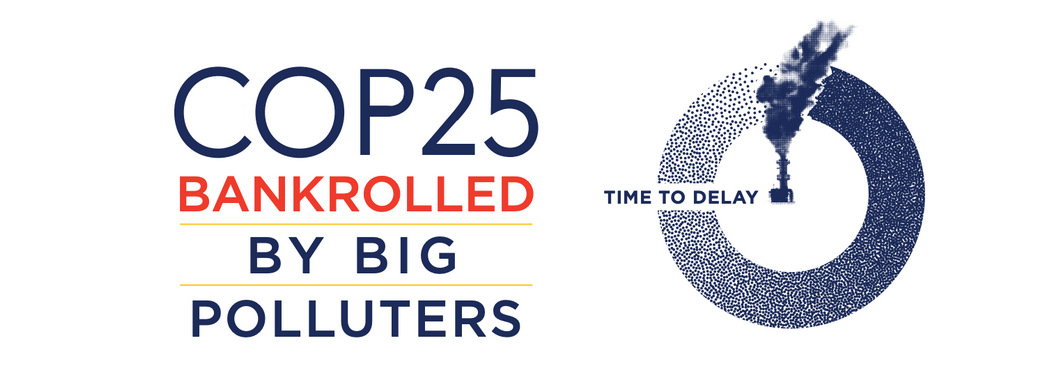
So it’s week two of the UN climate talks in Madrid, when the negotiations hopefully pick up steam and senior officials and ministers arrive to thrash out a deal.
But the negotiations have come under increasing criticism from scientists, NGOs, and activists for failing to act decisively to tackle the climate crisis, as well as failing to kick the Big Polluters out of the climate talks.
In the run up to next year’s crunch talks in Glasgow, the talks this year are focussing on rules for implementing the 2015 Paris Agreement. But scientists are getting increasingly frustrated at the slow pace of progress.
“We are at risk of getting so bogged down in incremental technicalities at these negotiations that we forget to see the forest for the trees,” said Johan Rockström, the Joint Director of the Potsdam Institute for Climate Impact Research. As he told the Guardian: “There is a risk of disappointment in the UN process because of the inability to recognize that there is an emergency.”
He is not the only one to criticize the process. Today, Greta Thunberg will meet officials along with other young climate activists.
On Friday, Thunberg criticized world leaders for not doing enough to halt climate change. “We have been striking for over a year, and basically nothing has happened,” she told activists at the talks. “The climate crisis is still being ignored by those in power, and we cannot go on like this.”
She added: “We would love some action from the people in power … People are suffering and dying from the climate ecological emergency, and we cannot wait any longer.”
There are many flaws with the UN process but one simple one is that the fossil fuel industry crawls all over it. A report published last week by a coalition of NGOs including Corporate Europe Observatory and Corporate Accountability highlighted the industry’s influence on the climate talks.
As CEO of Corporate Europe points out, “COP25 in Madrid is bankrolled by some of Spain’s biggest polluters and others heavily invested and involved in fossil fuels. In addition to their climate crimes, many have been tied to human rights and worker abuses around the globe. Sponsorship not only allows these corporations to wrap themselves in the green branding of the COP, but it also increases their access and influence over negotiations.”
The sponsored covered include Spain’s biggest polluter, Endesa, which produced just under 10 per cent of the country’s CO2 emissions, along with Iberdrola, Santander, Suez, Telefonica, Fundación Abertis, BBVA, Acciona, and Indra.
If this is not enough, last week witnessed the launch of the idiosyncratically named “Markets for Natural Climate Solutions” – whose founding members include some of our biggest polluters, including Chevron, BP, Shell, and IETA, the International Emissions Trading Association.
IETA is a vehicle by which the Big Polluters greenwash themselves. Nearly ten years ago at the Copenhagen climate talks, IETA was one of the finalists of the “Angry Mermaid” award for pushing false solutions on climate change. And IETA is still doing it. It has been doing it ever since its creation.
As the “Natural Climate Solutions” website says: “We are committed to creating global markets for carbon credits generated from natural climate solutions.”
Essentially, they greenwash their activities by planting trees that enables the oil companies to carry on drilling. At the press conference to launch the initiative last week, some two dozen environmental campaigners and indigenous community representatives walked out.
In response to the greenwashing initiative, some 160 environmental and indigenous rights groups called for carbon markets to be kept out of the formal guidelines for implementing the Paris Agreement from 2020.
A letter signed by the organizations said, “Carbon markets do not work … Burning carbon from fossil fuels in one part of the world cannot be ‘balanced out’ by offsetting carbon from natural land carbon cycles – that’s not how ecosystems work.” It finished by saying “NO to false solutions and dangerous distractions!”
It’s no wonder Twitter was scathing about the initiative:
Not surprised to see climate criminals Shell trying to peddle their markets for natural climate solutions nonsense at the UN climate talks.
Don't forget Shell are paying £5m towards existing Scottish Government tree planting and calling it offsets.https://t.co/H5hViCU2dl https://t.co/9XhcGPMcBw— Caroline Rance (@CaroRance) December 5, 2019
For decades, we have known that fossil fuels are the problem. But Big Oil still tries to hoodwink us that they can be part of the solution. We say no: It’s time to kick the polluters out of the UN climate negotiations. They should have been kicked out decades ago. But it needs to happen now. Once and for all.
The global community and UN can act decisively if it wants too. Under Article 5.3 of the Framework Convention on Tobacco Control, the tobacco industry is prevented from having undue influence over health policy. And it is way beyond time that the oil industry is kicked out the UN climate talks too.
Meanwhile the unsustainable status quo continues:
Solving the climate emergency means (1) dropping fossil fuels like the hottest potato; and (2) ensuring that the energy transition is just and equitable and promotes decentralized energy systems.
But these concepts are nowhere in the #COP25 negotiations.
— Jean Su (@ajeansu) December 7, 2019

